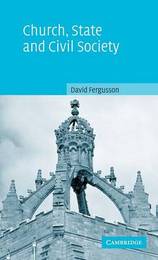
|
Church, State and Civil Society
Hardback
Main Details
| Title |
Church, State and Civil Society
|
| Authors and Contributors |
By (author) David Fergusson
|
| Physical Properties |
| Format:Hardback | | Pages:222 | | Dimensions(mm): Height 216,Width 140 |
|
| Category/Genre | Religion and beliefs |
|---|
| ISBN/Barcode |
9780521822398
|
| Classifications | Dewey:322.1 |
|---|
| Audience | | Professional & Vocational | |
|---|
|
Publishing Details |
| Publisher |
Cambridge University Press
|
| Imprint |
Cambridge University Press
|
| Publication Date |
2 December 2004 |
| Publication Country |
United Kingdom
|
Description
At a time when secular liberalism is in crisis and when the civic contribution of religion is being re-assessed, the rich tradition of Christian political theology demands renewed attention. This book, based on the 2001 Bampton Lectures, explores the relationship of the church both to the state and civil institutions. Arguing that theological approaches to the state were often situated within the context of Christendom and are therefore outmoded, the author claims that a more differentiated approach can be developed by attention to the concept of civil society. The book offers a critical assessment of the effect of the First Amendment in the USA and, in a concluding chapter, it defends the case for continuing disestablishment in England and Scotland.
Author Biography
David Fergusson is Professor of Divinity at the University of Edinburgh.
Reviews'... a balanced, well-informed and readable historical survey.' Church Times '... an impressive array of evidence from scripture, historical theology, ecclesiology and political theory, providing much useful material for practitioners and students to reflect on.' Reviews in Religion and Theology 'Fergusson has written a useful and stimulating book which I warmly commend.' Theology '... an elegant, accessible and measured discussion about the potential role of the church in contributing to cicil society in the twenty-first century. The writing is scholarly, marked by precision, based on a deep and smoothly assimilated knowledge of church history, and displaying an ironic and ecumenical spirit. Undergraduates and intelligent members of the public, as well as more advanced students and specialists in the field of religion and politics, will find much of interest to reflect upon here. ... offers guidance for Christians who seek ways to combine fidelity in their discipleship with a critical and creative engagement as citizens; it shows them they can be confident and constructive in this double task. It also offers reassurance to those outside of religious faith that efforts to influence society by religious groups do not constitute a front for, nor need lead inevitably to, theocratic intrusion, unwarranted interference of the defence of narrowly sectarian interests.' The Heythrop Journal
|